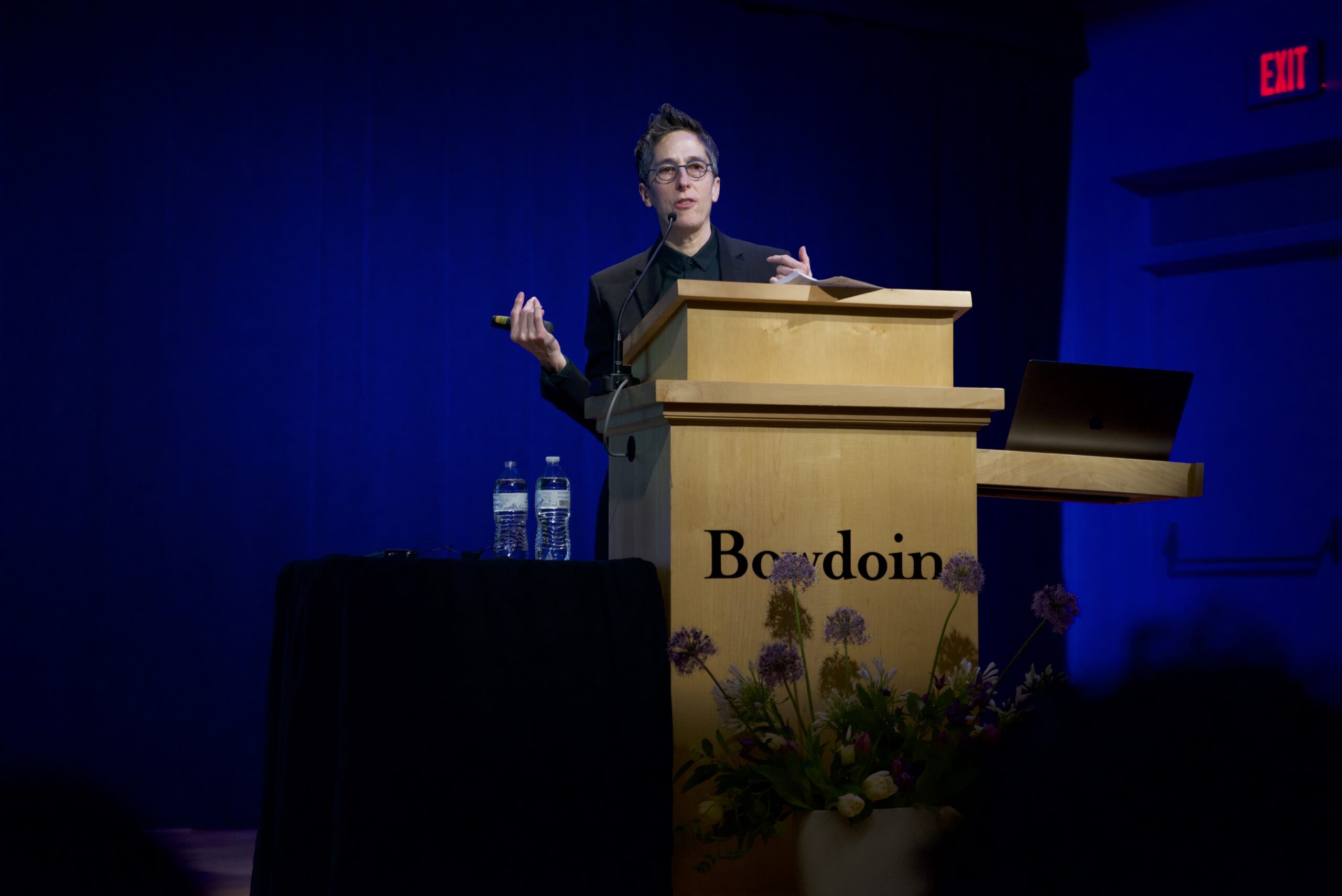Graphic details: An evening with Alison Bechdel
March 3, 2023
 Cora Dow
Cora DowOn Tuesday night, members of the Bowdoin community dusted the snow off their jackets and poured into Kresge Auditorium for the long-awaited arrival of Alison Bechdel, who delivered this year’s Kenneth V. Santagata Memorial Lecture.
Bechdel is a celebrated cartoonist and graphic memoirist whose notable works include “Dykes to Watch Out For,” “Fun Home: A Family Tragicomic” and “Are You My Mother?” Her graphic memoirs are considered by many to be touchstones of the form and have found particular resonance with queer audiences, so much so that “Fun Home” was adapted into a critically-acclaimed Broadway musical in 2015. She is also the originator of the Bechdel test, a three-pronged assessment of the inclusion of women in television and film.
In her lecture, Bechdel provided an overview of her major works and the themes they explore. As she lectured, she clicked through projected excerpts from her comics and graphic novels, often provoking bouts of laughter from her audience.
Bechdel began with a brief exploration of “Dykes to Watch Out For,” the 1983 comic strip that launched her career as a cartoonist. The strip depicts a group of friends—most of whom are lesbians—as they navigate their personal lives and confront their political realities.
For Bechdel, the comic strip’s creation arose from a need to take the matter of lesbian representation into her own hands.
“I didn’t see people like me or my friends reflected anywhere in the culture—we were literally omitted from the record,” Bechdel said. “So I just started creating that depiction myself.”
It was in a 1985 installment of “Dykes to Watch Out For” that the Bechdel test first publicly debuted. In the years that followed, the concept began to take on a life of its own among media scholars and critics before infiltrating popular culture. In a recent social media trend, people have begun assessing whether their own real-world conversations meet the test’s criteria.
For Bechdel, the heightened awareness of representation she gained at a young age—an awareness directly responsible for both “Dykes to Watch Out For” and the Bechdel test—was a blessing and a curse.
“Having that X-ray vision meant that most of the popular culture suddenly became lost to me. I couldn’t even go to a movie anymore,” Bechdel said. “But to make up for that, I had this very rewarding sense of mission…. And looking back, I think it was kind of this huge moment for people fighting for visibility and legislative change.”
Following the success of her comic strip, Bechdel made her foray into graphic memoir with “Fun Home,” a work chronicling her tumultuous upbringing and her relationship with her father. Though the memoir was met with substantial praise for grappling with issues surrounding sexuality and gender, it has been met with backlash for the same reasons, and has been subsequently banned in numerous school districts.
“This recent frenzy to ban books exploring racism and gender and sexuality in an open, honest way is crazy; is really disturbing,” Bechdel said. “I resent having to set aside the work I really want to be doing and go off and defend something which doesn’t need to be defended.”
The thread that connects Bechdel’s work is the idea that the personal is political—an adage to which she alluded in her lecture. By using her work to share truths about her experiences and identity, she unearths greater truths about what it means to live on the margins.
“When I first started writing this talk, I really wanted to keep politics out of it,” Bechdel said. “But it kind of became impossible to avoid politics, just as it did when I was young and found that merely by existing, I had stumbled into a culture war. I guess that’s what politics is. But still, … telling the truth is important. And we have to figure out ways to do that.”
Bechdel’s lecture was introduced by President Clayton Rose, who expressed his appreciation for her candor and artistry.
“She is a profoundly thoughtful and influential writer and artist who has used the comic form in new ways, weaving personal revelations about her life into broad philosophical discussions about our shared human experience,” Rose said in his opening remarks. “Her work is unique, resonant and important.”
Paloma Aguirre ’23, a Gender, Sexuality and Women’s Studies major and longtime fan of Bechdel’s, shares Rose’s admiration for the timeless quality of her work.
“Bechdel’s comic strips are from the ’90s and yet when you read them, they still hold up,” Aguirre said. “The queer issues and politics that Bechdel talks about in those comics are still so present today.”

Comments
Before submitting a comment, please review our comment policy. Some key points from the policy: